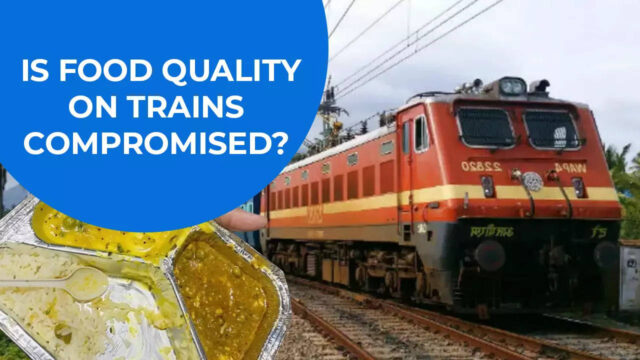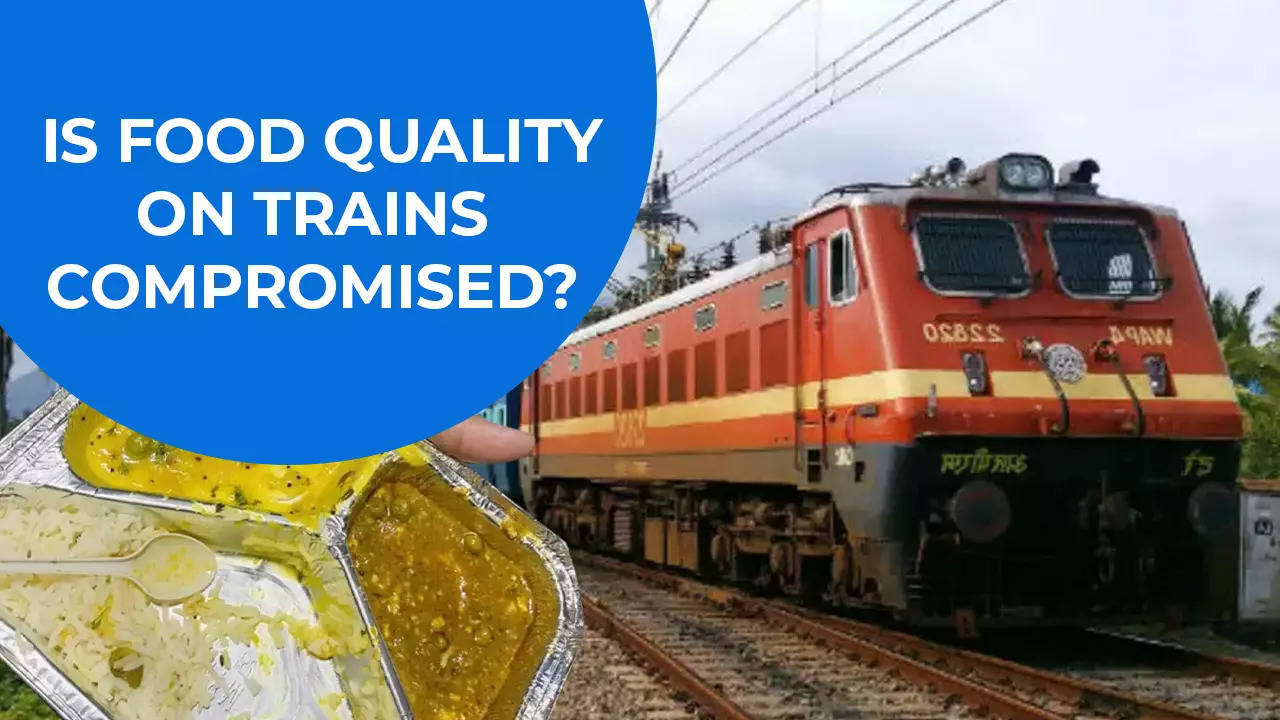
Food on Indian Railways trains: The Public Accounts Committee has recently presented a report to the Lok Sabha, stating that frequent changes in the railways’ catering policy and discrepancies in its implementation have led to compromised food quality, hygiene, and cleanliness. The committee, chaired by Congress MP Adhir Ranjan Chowdhury, conducted a detailed examination of the railways’ catering policy and its impact on food services in trains.
According to PTI, the report, titled ‘Catering Service in Indian Railways,’ found that several catering activities, originally assigned to the Indian Railway Catering and Tourism Corporation (IRCTC) in the 2005 policy, were transferred to the zonal railways as per the 2010 policy, and then reassigned back to the IRCTC in the 2017 policy.
The committee stated that frequent changes in catering policy and the consequent transfer of responsibility from railways to IRCTC and back have created a state of uncertainty in the management of catering services provided to the passengers. The report also highlighted discrepancies in the implementation of the 2017 Catering Policy.
Also Read | Explained: What is Vande Bharat standard of trains to which 40,000 Indian Railways coaches will be upgraded?
Some of the discrepancies include the absence of a pantry in certain long-distance trains, base kitchens located outside railway premises resulting in compromised food quality, hygiene, and cleanliness, presence of unauthorized vendors on platforms and trains, and unfair practices at stations and trains.
Expressing concern about the quality of food served on trains, the report mentioned that the IRCTC was supposed to set up base kitchens on railway premises for monitoring and controlling the quality and hygiene of the food being cooked, as per the 2017 policy. However, out of the 131 base kitchens, only 16 were located inside the railway premises, while the remaining 115 were situated outside and were not subjected to quality checks.
The report stated that since food was being procured from outside, it was evidently not subjected to regular and constant quality checks, thus failing to ensure quality, hygiene, and cleanliness.
Also Read | Swiss expertise for Indian Railways! Collaboration with Switzerland firms for tunnelling works
The report revealed that seven zonal railways failed to prepare the master plan for food services, as required by the 2017 policy, until an audit pointed it out. These railway zones are East Central, Eastern, Northeast Frontier, North Western, South Eastern, South Western, and East Coast Railways.
The report also mentioned that according to the Catering Policy of 2010, gas burners in pantry cars were supposed to be replaced with electric power equipment to prevent fire accidents. However, the committee found that 103 pantry cars manufactured by Integral Coach Factory during April 2011 to March 2016 were equipped with centralized LPG cylinders with open flames instead of electric power equipment.
The railways has replaced the Integral Coach Factory (ICF) coaches with Linke Hofmann Busch (LHB) coaches, and only LHB pantry cars are being manufactured now, gradually phasing out the ICF pantry cars.
Also See | Dehradun airport: New terminal building (Phase II) of Jolly Grant airport inaugurated; check top photos & facts
The committee also highlighted the absence of pantry cars in several long-distance trains that run for more than 24 hours. This led to the presence of unauthorized vendors on trains, selling unhygienic and unhealthy food products, posing a safety threat to the passengers, the report said.
The report emphasized the need for Indian Railways and IRCTC to improve their catering services on running trains, platforms, and other areas where passengers require them. It called for a holistic and continuous effort to benefit the commuters.
According to PTI, the report, titled ‘Catering Service in Indian Railways,’ found that several catering activities, originally assigned to the Indian Railway Catering and Tourism Corporation (IRCTC) in the 2005 policy, were transferred to the zonal railways as per the 2010 policy, and then reassigned back to the IRCTC in the 2017 policy.
The committee stated that frequent changes in catering policy and the consequent transfer of responsibility from railways to IRCTC and back have created a state of uncertainty in the management of catering services provided to the passengers. The report also highlighted discrepancies in the implementation of the 2017 Catering Policy.
Also Read | Explained: What is Vande Bharat standard of trains to which 40,000 Indian Railways coaches will be upgraded?
Some of the discrepancies include the absence of a pantry in certain long-distance trains, base kitchens located outside railway premises resulting in compromised food quality, hygiene, and cleanliness, presence of unauthorized vendors on platforms and trains, and unfair practices at stations and trains.
Expressing concern about the quality of food served on trains, the report mentioned that the IRCTC was supposed to set up base kitchens on railway premises for monitoring and controlling the quality and hygiene of the food being cooked, as per the 2017 policy. However, out of the 131 base kitchens, only 16 were located inside the railway premises, while the remaining 115 were situated outside and were not subjected to quality checks.
The report stated that since food was being procured from outside, it was evidently not subjected to regular and constant quality checks, thus failing to ensure quality, hygiene, and cleanliness.
Also Read | Swiss expertise for Indian Railways! Collaboration with Switzerland firms for tunnelling works
The report revealed that seven zonal railways failed to prepare the master plan for food services, as required by the 2017 policy, until an audit pointed it out. These railway zones are East Central, Eastern, Northeast Frontier, North Western, South Eastern, South Western, and East Coast Railways.
The report also mentioned that according to the Catering Policy of 2010, gas burners in pantry cars were supposed to be replaced with electric power equipment to prevent fire accidents. However, the committee found that 103 pantry cars manufactured by Integral Coach Factory during April 2011 to March 2016 were equipped with centralized LPG cylinders with open flames instead of electric power equipment.
The railways has replaced the Integral Coach Factory (ICF) coaches with Linke Hofmann Busch (LHB) coaches, and only LHB pantry cars are being manufactured now, gradually phasing out the ICF pantry cars.
Also See | Dehradun airport: New terminal building (Phase II) of Jolly Grant airport inaugurated; check top photos & facts
The committee also highlighted the absence of pantry cars in several long-distance trains that run for more than 24 hours. This led to the presence of unauthorized vendors on trains, selling unhygienic and unhealthy food products, posing a safety threat to the passengers, the report said.
The report emphasized the need for Indian Railways and IRCTC to improve their catering services on running trains, platforms, and other areas where passengers require them. It called for a holistic and continuous effort to benefit the commuters.




































